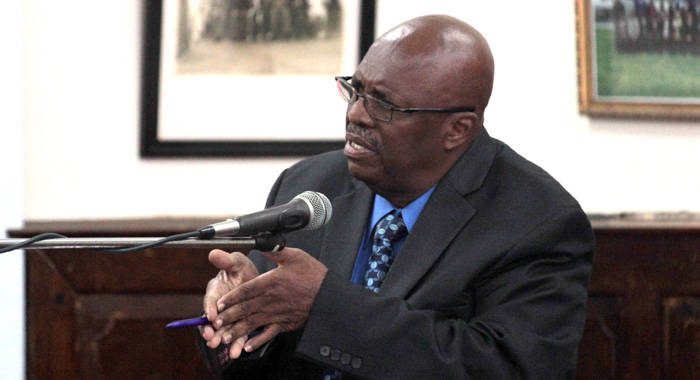Opposition Leader Arnhim Eustace says measures recently announced by the Monetary Council of the Eastern Caribbean may not be enough to stimulate economic growth St. Vincent and the Grenadines and other members of the Organisation of Eastern Caribbean States (OECS)
Last week, Prime Minister Ralph Gonsalves, who is also chair of the Council, told OECS residents that the new strategy “will result in a stronger banking sector, which, along with other financial institutions, plays an essential role in facilitating economic growth and development in our region.
“The Monetary Council is resolved to do whatever it takes to improve the economic fortunes of our Currency Union. Indeed, we will continue to take deliberate and concrete steps to stimulate economic activity and strengthen our banks as we work assiduously to help secure a better and brighter future for all our citizens and residents,” Gonsalves said.
He praised several regional and international governments and financial organisations for their “significant technical and financial resources required to implement successfully these decisions”.
But, speaking on his radio programme on Monday, Eustace, an economist and former finance minister, said the OECS has been going through a serious economic crisis, adding that he has spoken in SVG repeatedly about the negative growth of the economy and its implications.
He pointed out that for almost every year until last year, the Eastern Caribbean Central Bank (ECCB) made “very large profits”.
“And all of a sudden last year, it made a loss of 18 million dollars,” Eustace said, adding that economic growth in the sub region is slow and has had its impact.
He pointed out that in 2014, average growth within the nine-member grouping was 1.3 per cent.
“That is not a high rate of growth. You are barely moving,” he said, noting that this year’s projected rate of growth is 2.4 per cent for the sub region.
Eustace said the regional economy continually faces the challenges of severe weather and economic downturn, adding that faster recovery and strong job creation is needed.
He said that banks across the region are starting “to get more and more into trouble”, adding that while banks have money to lend, businesses are reluctant to borrow.
In 2014, despite banks having excess liquidity, loans decreased 4.5 per cent, Eustace pointed out.
“And, as the prime minister said, this situation has to change,” he said.
With non-performing loans across the region at 18.5 per cent, Eustace said that businesses that do borrow are finding it increasingly difficult to repay.
“That’s a very, very high per cent … They will kill the banks,” Eustace said.
Banks are now forced to lay off persons, as has been the case in SVG recently, Eustace said.
He said that the decision of the Monetary Council to reduce to 2 per cent from 3 per cent the interest on deposit will not be enough to help banks, even as depositors will be impacted negatively.
“I don’t think a one per cent decline in the credit will make a major difference.”
He said the situation is “not simply a banking issue”, adding that economic growth has to come from policies and programmes that the government puts in place.
“That ain’t no short-term anything that you expect this year, next year or the year after,” he said.
Eustace said Gonsalves’ statement is “written as if it is an easy thing to deal with”.
“It is far from so; a very complicated issue for all the OECS nations to cause the economy to grow,” he said, adding that the Vincentian economy did not grow in 2014.
Related:
“The point I am trying to establish here is that the banks are in real trouble. The banks in our sub region are in real trouble. And the hope is that those things outlined there is what is going to bring the banks back into profit and our economies will look good and so on, but I still believe that it is very short on economic measures that will improve our economies,” Eustace said.
In his address, Gonsalves had said that the measures announced by the Monetary Council are to ensure that deposits are made safe, but Eustace said he doubted that this was possible.
“I have reservations that a reduction in deposit rate of one per cent will make any difference. Along with this has to come a series of measure in your own economy,” Eustace said.
He gave an example saying that a member of the currency union that is interested in tourism might consider reducing the VAT on the sector from 10 to 5 per cent.
He, however, noted that that will be a national decision that will help to stimulate the economy, adding that St. Vincent and the Grenadines might consider a “meaningful plan” for the ailing banana industry.
“That has nothing to do with the bank. So what I am saying, we need a more comprehensive assessment presented to us with respect to each country in the union. This attempts to address part of the problem within the banks itself, but that is also dependent on how our economies are doing. We can’t isolate them. Those are just banking measures but other measures have to be taken with some emphasis on what those measures are going to be for the varying sectors of our economy,” Eustace said.







You can be sure if Gonsalves had any input, it can only be that of a fiscal dunce, so we will only get into more trouble than we are already in.